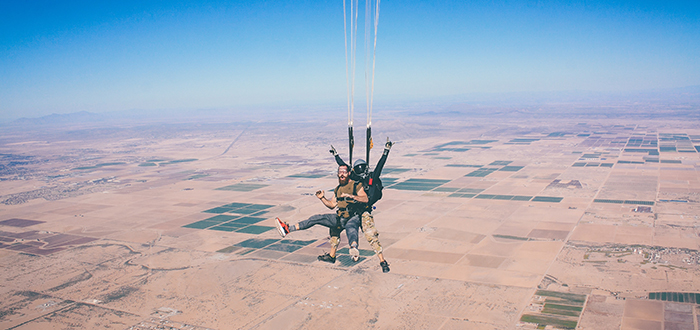Imagine that, for some reason, you’ve been talked into doing something which might be completely out of character for you on your next birthday. So you wake up the morning of that birthday, get dressed, hop in the car, and drive to a small airstrip and get ready to jump out of a perfectly good airplane with a device strapped to your back. You are going skydiving.
Perhaps you’ve been able to work yourself up for the moment. You’ve told yourself what a great story it’ll make, how exciting it’ll be, and how unique the opportunity is. And that rationale has propelled you to this moment. It’s even given you enough adrenaline to get on the plane. But there will come a moment—a moment when the plane is at its height, when the green light comes on, and the door opens—when adrenaline won’t cut it anymore. That’s the moment when you’ll have to make a choice—either to step out of that plane, or to head back to your seat.
I would propose that that decision is a decision of trust. Do you really trust the instructor? Do you really trust the parachute? For that matter, do you really trust the manufacturer of that parachute and the safety inspector who signed off on it? See, all our choices are really, if you boil them down, based on trust at the core.
If you really step out of the plane at that moment, chances are the trust you display by doing so didn’t happen in a moment; rather, it was cultivated over a period of training, conversations, and questions. This isn’t unlike what happens in a small group.
As a leader, you want your group to have a culture of openness and vulnerability. You want people to share freely what they struggle with as well as their joys. You want these people to know and love each other deeply. In short, you want it to be an atmosphere of trust. But that trust doesn’t happen by accident. You, as a leader, can take an active role in building that kind of trust among your group members, and here are three ways how:
1. Make the first move.
Trust starts to happen when someone makes the first move. When someone is willing to step out and trust someone else with their true selves—their fears, their doubts, and their unmet expectations. This isn’t an easy thing to do.
But trust is also like a fire: once you get a small spark, it can quickly grow. You, as a leader, can be the spark. Of course, that means that you have to also be the first one to take a chance at opening yourself up to other people. But as you do, you’ll find those around you who are hungry for an environment of trust where they can do the same.
2. Invite people to tell their stories.
One of the easiest ways to start building trust in your group is to provide an opportunity for people to tell the stories of their lives. There are a number of ways you can do this—you might, for example, devote the first 10 minutes of each of your group times for one person to share some of their story to help others know them better.
But it shouldn’t stop there. When you come across a point you are trying to make in the group, instead of sharing a story from your personal life in order to illustrate it, ask someone else to share their story. Of course, that would mean that you, as a leader, have taken the time to get to know people well outside of the group which is, by the way, another excellent way to build trust.
3. Make time for connection.
Trust is something that is built over time. It’s constructed brick by brick as people become more and more comfortable and familiar with each other. Sure, that can happen in a structured Bible study group, but it can happen much more quickly through the unstructured times.
Don’t underestimate the value of asking your group to meet for lunch or dinner or go to the park together outside of your official group time. These opportunities for connection aren’t just fun; they become the basis for solid relationships.
Trust doesn’t happen by accident. It’s not easy, and it will take some risk, but the spiritual growth and development that happens as we live together in authentic community is worth it.





Leave a Comment: